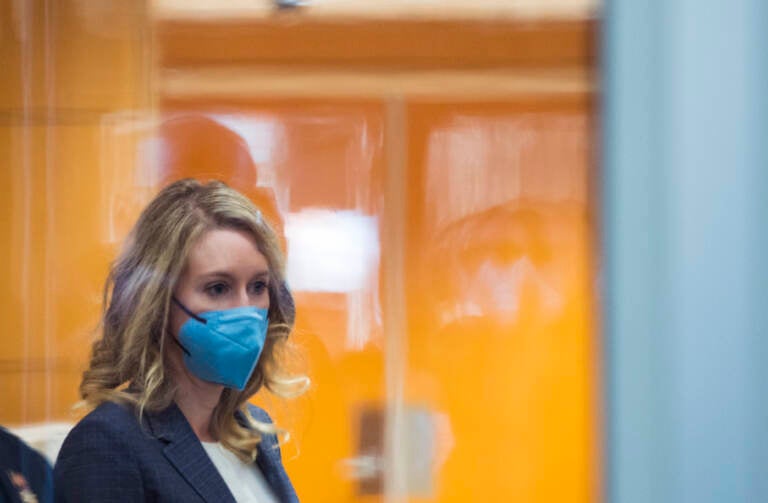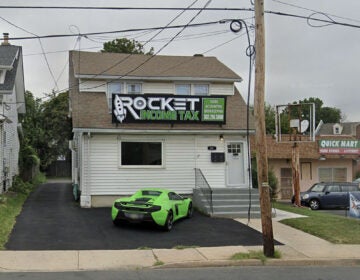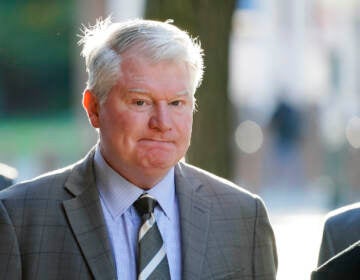Elizabeth Holmes verdict: Former Theranos CEO is found guilty on 4 counts

Elizabeth Holmes walks into federal court in San Jose, Calif. (Nic Coury/AP)
Elizabeth Holmes, the former chief executive of the once high-flying biotech startup Theranos, was found guilty on four counts of defrauding the company’s investors. She was found not guilty on four counts of committing fraud against patients. They jury could not reach a unanimous decision on three charges.
When the verdict was read, the court was eerily quiet. Holmes, who sat masked in the courtroom, had no visible reaction. She later hugged members of her family in the front row of the court. Holmes, who is 37 years old, could face up to 20 years in prison, although legal experts say her sentence is likely to be less than that.
During the nearly four-month federal trial in San Jose, Calif., jurors heard from over 30 witnesses called by prosecutors. Together, they painted Holmes as a charismatic entrepreneur who secured hundreds of millions of dollars in investment for a medical device that never delivered on her promises. When Theranos’ technology fell short, the government argued, Holmes covered it up and kept insisting that the machines would transform how diseases are diagnosed through blood tests.
Specifically, the jury found Holmes guilty of defrauding Theranos investors. However, the jurors didn’t find her guilty of committing fraud against patients who got faulty results from using Theranos blood and lab tests.
The jury’s deliberated for seven days before reaching the decision.
Holmes accused deputy Ramesh “Sunny” Balwani of sexual abuse
Holmes took the witness stand for more than 20 hours to defend herself. She accused her ex-boyfriend and former deputy at Theranos, Ramesh “Sunny” Balwani, of sexual abuse, saying that this abuse clouded her judgment.
Balwani faces a separate fraud trial in the same court in February.
Holmes also showed remorse on the stand. She said she wished she had handled some key business matters differently. But she blamed others for the downfall of Theranos. She said lab directors whom she had trusted were the ones closest to the technology. And she said Balwani, not her, oversaw the company’s financial forecasts, which were later discovered to be grossly inflated.
Yet the government offered evidence that Holmes had an iron grip on Theranos’ operations. Prosecutors argued she did not stop — and even helped spread —falsehoods about the company that misled investors into pouring millions of dollars into the startup. Theranos’ value, once estimated at more than $9 billion, was ultimately squandered.
Promised a finger prick of blood could be scanned for hundreds of diseases
A Stanford University dropout, Holmes dazzled Silicon Valley when she founded Theranos at age 19. She promised its technology could screen patients for hundreds of diseases with just a finger prick of blood.
She cultivated a mystique that included a signature black turtleneck like Apple co-founder Steve Jobs, whom she greatly admired.
Big names from former President Bill Clinton to former Secretary of State Henry Kissinger to Mexican billionaire Carlos Slim believed in the company, helping it attract global investment and a valuation of more than $9 billion before its fall from grace in 2015. Former U.S. Secretary of Defense James Mattis and media mogul Rupert Murdoch also invested in her startup.
But when Theranos’ machines were rolled out to Walgreens stores in California and Arizona, they gave patients false or flawed results. One patient testified that she was led to believe she was having a miscarriage after taking a Theranos test, when indeed her pregnancy was viable. Another patient thought her cancer had returned when it had not, following a test.
Lawyers for Holmes have vowed to appeal. Legal experts say winning an appeal of a jury verdict is rare, however.
It is unusual for tech executives to face criminal changes when their startups collapse under the weight of unrealized promises. Former prosecutors have said that the egregiousness of the fraud at Theranos, as well as the fact that the startup was in the highly regulated health care industry, where the health of private citizens is on the line, distinguished this collapse from that of other once hyped startups that also flamed out.
9(MDAzMzI1ODY3MDEyMzkzOTE3NjIxNDg3MQ001))




